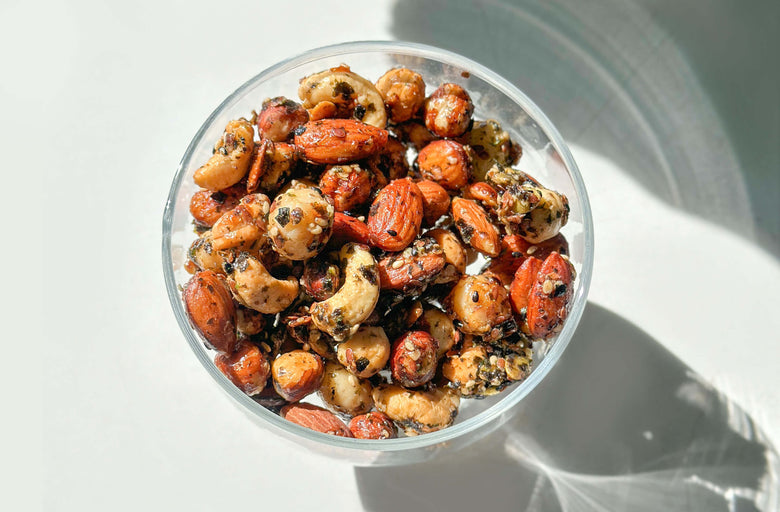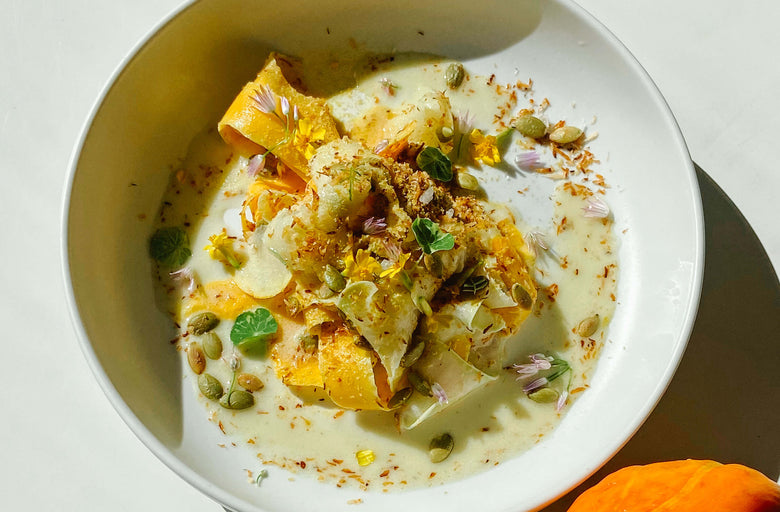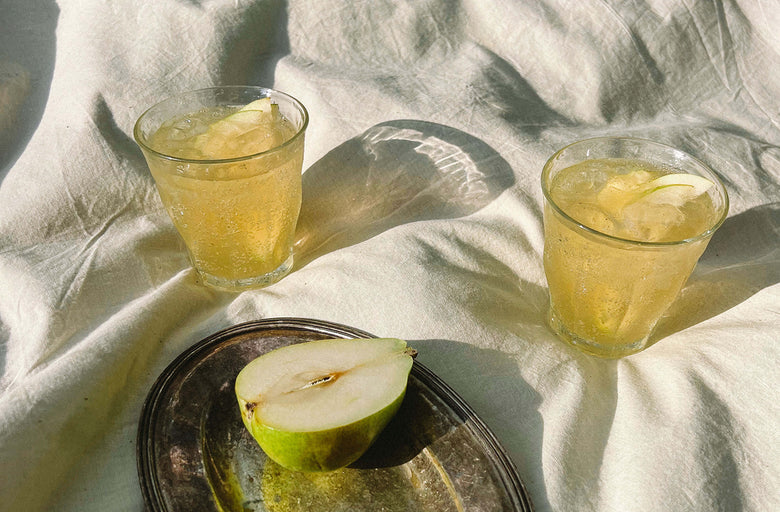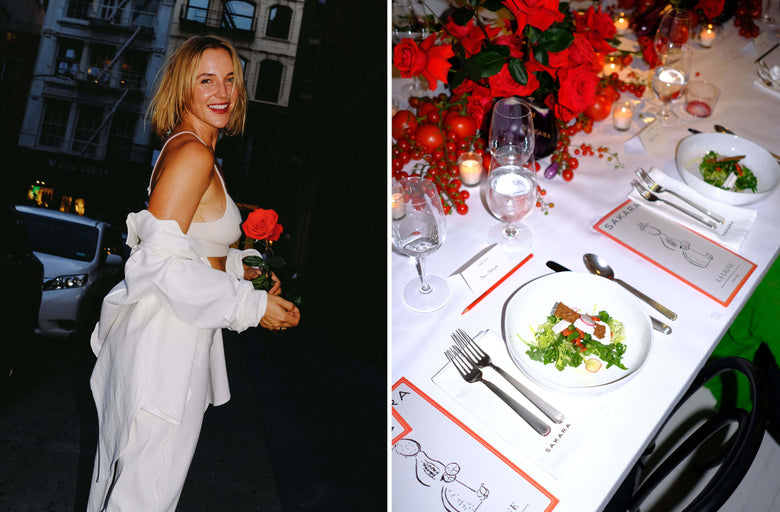How do you know when you're grown? For multi-hyphenate badass Michaela Angela Davis, experience has something to do with it; her resume reads like the back-cover blurb for a book you can't wait to read. It also has something to do with taking your power back from the moon...more on that later.
Raised in Washington DC, Davis arrived in NYC at 17, where she studied at New York University’s Tisch School of Arts before being accepted to the Stella Adler Acting Conservatory and apprenticing with her aunt, a former stylist for Harper’s Bazaar and photographer Richard Avedon. She went on to work for influential magazines like Essence, Vibe, and Honey, the last of which she served as editor-in-chief, styling icons like Diana Ross, Prince, Beyoncé and Oprah along the way. But while Davis was firmly entrenched in fashion, music, and culture, she was also fearlessly fighting for social justice. She has always leveraged her position to explore identity: specifically, what it means to be Black and what it means to be a woman.
Now in her 50s, she is taking a ferocious bite out of middle age. She balances writing projects with personal passions like creating cultural conversation projects Mad Free and House of Hair. Her no-nonsense verve is contagious. As she talks about her journey, you find yourself unconsciously nodding, thinking, “Yes, that’s it!” Dedicated to opening up the conversation about aging, she sat down to talk about how the last thirty years on the pulse of culture, politics, and activism is shaping the woman she wants to be for her next act (or three).

Did you always know you were going to be a creative force?
I come from a family of artists. My parents were a combination of Black bohemian hippies and astute legal minds. My father was the first Black mediator for the federal government and my mother worked in the State Department. It was a mix of Black American and European cultures because my parents went to Europe very young. I grew up in Washington D.C. and went to an amazing high school called Duke Ellington School of the Arts. We got this world-class education in the arts and the possibility was poured into me. I was never told I couldn't explore Greek tragedy and Parliament Funkadelic at the same time. When you're a child and you're allowed to love both Faulkner and Grace Jones, you walk through the world in a certain way.
I had a very expansive, cultural education and exposure. I was always in between culture and justice, culture and politics; even as a kid I had a keen awareness of justice. My environment was such that I really could've gone either way. There was a balance between knowledge and creativity and we knew that we didn't have to make a choice. All of us did very well academically, but my siblings and I all went into the arts.

When do you think you found your voice?
I really feel as women our voice changes. There's one voice when I arrived in NYC at 17 and I was an artist and into the underground scene. That's one voice. A lot of my expression was visual because I was in fashion. That was my communication. How I dressed. How I moved. How I danced. It was such a culturally rich period and even though I wasn't writing at the time, my approach to fashion and styling was a communication.
When you hit your 50s, it's so fun. You're a grown-ass woman and you don't have any problems saying no.
There's not just one voice that you find, right? There are new voices in you forever if you want them to be. There's a whole choir in a woman and I think the more intersectional you are, the more diverse your choir. It's the courage to allow them to speak. What's significant about this moment is that there are enough examples that you will be supported. You'll be dragged, too, but it's like, what are you going to pay attention to? Are you going to pay attention to the dragging or are you going to pay attention to the support, because there's a lot of it. What's interesting now about being in my 50s is listening to the voice that says, “Go to Sedona now and write.” I've trusted this inner compass enough to know that this is the right thing to do because I have all this evidence of all the other times that I said yes and it led me to interesting places. One of the greatest gifts of not being in my 20s and 30s is the neurosis is gone because your life is what is in your head. That's your intimate place. Nobody knows what you're telling yourself. Nobody knows what you call yourself at night. No one knows how you wake up and feel in the morning. I still wake up and think “Oh f*ck!”, what did I say or do? But when you actually have peace inside, you have the tools to take yourself out of that very quickly. I don't dwell on it all day. Your quality of life is really how you're treating yourself emotionally, physically, and spiritually
What are some practices you find helpful on a daily basis?
Prayer and meditation are really important. That's really what mantras are. They're interruptions for your destructive thinking. We say things to ourselves that are terrible. For example, my daughter, who is 28. I would never tell her the things I tell myself. That is my gauge. And women don't have to have children to have that as a marker. You just ask yourself, “Would I say what I say to myself to my best friend, to my mom, or to my sister, or anyone I care about?” You wouldn’t say “Oh you’re a failure, you suck, or you’re fat.” No. You can't be beating up on yourself. The thing about that, too, is so many women in particular have been sold a bill of goods that is just so damaging, especially for women that are over 40. We didn't have Sakara Life and Into The Gloss and all these women-centered platforms. There were few and most of them still were created by men in an industry that was interested in keeping us neurotic. There's a lot of money in keeping women feeling crazy and sick and comparing each other and feeling bad about themselves and always trying to correct things.
Now that we are able to tell our own stories, we get to say who's a hero. We get to reframe what is beautiful, who is beautiful. We get to create a new narrative and that's real power. Certainly, we need equal pay. Let's be clear. I want my bag, but more than that I want to have control. I had a friend tell me she didn't want more money for her role. She wanted more control of the company’s money. Not just personal equity but the ability to make decisions around where the money was spent. What they’re going to find. What they’re going to produce. That's a whole different kind of power.
I use prayer, too. I don't consider myself Christian, but there are prayers that come from a Christian background. I just take what I can use from all faiths and from indigenous people. I started with five minutes, just sitting and breathing and giving my brain a break, and then I expanded it to 15 minutes. I just go through a gratitude list, especially when I'm afraid or if I have big projects. I think, "How am I going to get this done?” Then I go to what I am grateful for., “Look at the sun. Look at these flowers my friend sent me. Look at my big fat kitty." It’s the little things but it works every time.

Can you talk about the relationship you have with your body.
I've had a very complicated relationship with my body for as long as I can remember. I was a chubby kid in a family of almost perfect women. Literally, one of my sisters was a model. My other sister is super beautiful. My mother looks like Lena Horne. I was this chubby girl and I was lighter than everybody. I had fuzzy blonde hair and I felt like an outsider. I was very loved but I felt different. I remember the early 80s when food disorders were surfacing. By the time I got to college, I had full-on bulimia. What I did know to do was get help. I'm so fortunate that I used the services that were at NYU and I joined a group. Luckily, it didn't last long, but I was in it. The odd thing was, I became a vegetarian at 14 because I was chubby and I was taking this African dance class and my teacher was from Senegal and he was a vegetarian. I never even heard of it before then. I dropped weight really quickly and by the time I started high school, I was tall and lean. It was a whole thing, but my relationship to food was shifting. It was something internal; if you have an eating disorder, it's deeper.
From an early age, I understood the connection of good food and how my body responded to it, especially when I wanted my body to do things. I wanted my body to dance. I wanted my body to look good in clothes. So even with my eating disorder, I was binging on “healthy” food. It was crazy. It's still bulimia, but I never had an intense detox from fast food or packaged food. I didn’t have a taste for it. Certainly, sugar is big and I'll probably eat french fries until the day I die. But I did struggle with food and body image given the industries I worked in, fashion and dance.
When I became pregnant in my late 20s, I started meditating in a real way. I made a relationship with myself and my body that was deeper because somebody else was in there. It was something I really wanted to protect more than I wanted to protect myself. The practice of listening to my body started then and I have tried ever since. I fall off all the time but I get back, no matter what. I know what it is to listen and love the effects and the result of treating myself well. That bulimic little girl is always in there judging, looking at my thighs, looking at my stomach, and I need to keep that down because I don’t think it ever really goes away.
Now that we are able to tell our own stories, we get to say who's a hero. We get to reframe what is beautiful, who is beautiful. We get to create a new narrative and that's real power.
How do you use food to fuel your body, mind, and soul now?
After my daughter left, I struggled. And I want to say this first: I'm very interested in having women not need to be a mother to understand that you deserve to eat well.
But before she left home, I would buy good food and have whole meals for her. I didn't send her out in the world with just a cup of coffee. When she left, that whole idea of cooking for myself and going to the market went to pieces. I was working a lot, traveling more. [Ed. Note: Davis has been a frequent contributor to CNN, BET, and VH1 among others]. The very intentional lifestyle fell away as I got busier. There was only one person home and I fell back into the bad habits of my 20s. When I got busy, I didn’t eat all day and then overeat at night. You know that voice that says, “I want some pasta now!” Or I eat six brownies at 10 p.m. Even if they’re vegan, it’s still not good.
I knew I had to make a major change in my life. So I decided I was going to do what I wanted to do, which is more writing and more personal projects. I stopped working at CNN and other networks. I went from being a consultant or being freelance to being an actual entrepreneur. The product that I'm selling now is my stuff, my intellectual property. I had to hustle in a different way. I had to work in a different way. I wasn’t going to survive if I didn't take better care of myself. So I had to do the opposite action of what was going on. Being busy meant I ate the worst, slept the least, and exercised little. When I tried Sakara for the first time, I thought… “Oh, that’s handled.” I love that it was done, complete. I didn’t have to chop or cook anything. And it was a treat for me that I could look forward to. The biggest thing was the breakfast because how you start the day is what matters. It’s the same thing with your thoughts, right? How you start the day can really determine what that day is going to look like. So if I start my day with a couple of minutes of meditation, a couple minutes of just internal care and some beautiful Rose Petal Pancakes, that's a nice start, right? If I want to put out good things, I need to be putting good things in. And eating well made me feel the care I need to do my best work.
If I want to put out good things, I need to be putting good things in. And eating well made me feel the care I need to do my best work.
And being over 40, you really can't grind it out like you did before. You can't just go on sheer energy, sheer will, and sheer youth. You don't have that reserve anymore. You need to be smarter about your actual fuel. It's a practice and I admit I will fall off now and then but I get back on because I know how it feels. You need enough time to feel better so you know that's what you want to get back to. So many people don't even know what it feels like to feel good. That is what is great about a plant-based diet. When I do feel toxic or weird, I know I can reset. It’s the same with the gym. You feel better when you move. Good habits support each other.

So, do you see eating as a self-love ritual now?
Yes. it’s more than the taste. It is the color, the attention to detail. Like edible flowers that you put on your plate. It may influence the color placemat I use. Coming from an artistic background, I appreciate pretty things. We often don't connect plant-based or nourishing food with pretty. It's almost the opposite. When I visited South Africa, they talked about the importance of five colors on your plate. And I love that. These colors can instantly make you feel better. You just feel better with more greens in your body. It's so simple but so significant. You don't feel deprived at all.
You are “on the other side” of menopause, as you put it. Tell us about embracing this new chapter in your life.
Let me just be clear. That shit is not for sissies. But I am committed to not being a generation that doesn’t talk about it. It's much like how women now are talking about their period in real ways that are empowering. It is ridiculous for us to be ashamed or hide something in the first place. It’s part of being a woman. Menopause is the same. There's so much shame around it particularly because it brings ageism into the mix. There’s a history of women being shamed for their bodily functions. With menopause, you’re shamed for your body and your age. Both things you can’t control and you shouldn’t want to control. Again, it's that bill of goods from our patriarchy.
I talked to a woman in South Africa about menopause. In her culture, it is revered, an honored phase in life. She said, “You really don’t have a word for it in English. It translates to “moon drivers,” it means you're no longer driven by the moon. You drive the moon. You're in a place where you're not beholden to your children, to your menstrual cycles, to all these things that pull you around. You're now on the side where you guide your life and you're in control. It’s a prominent shift because most women feel controlled by their hormones with their periods. Women in their culture look forward to it. They are the boss. They are the goddess. A lot of times we frame this notion of being a goddess around how fruitful you are. How you can reproduce. How ripe you are. Menopause is about being a goddess and a leader. That's like freedom, but we've been conditioned to believe it’s an end. You are no longer viable. You are done. When in actuality, you are more free, more ready. It's literally the opposite story than what has been told to us.

What’s been the most freeing about reaching this age?
The benefit is that insecure, anxious, young woman is gone. She doesn't live in my head. She doesn't have a seat at the table anymore. The relief from that is so profound. The idea of peace of mind is really much more powerful than I knew it to be. It just was a thought before and it seemed really esoteric and Pollyanna. But now I know what it means. I have the space and peace in my mind to put in it what I want. That to me is true power and it's the closest thing to freedom I have felt. I am very interested in actual liberation and I don't know how we get there as people, but I know that I have the possibility to at least explore it myself. When you hit your 50s, it's so fun. You're a grown-ass woman and you don't have any problems about saying no.
I don't feel like I'm aging gracefully. I feel like I'm aging honestly. I'm aging with a little bit more radical energy than grace because that's what motivates me.
And what sucks?
What sucks is all the physical stuff. From age 25 to about 45, I looked the same. I was familiar with myself. My body didn't really change apart from my pregnancy. But to not recognize my body sometimes is very weird, or to look in the mirror and see my face shifted again, or there’s some new line. That is the biggest challenge. It forces me to have a very dynamic relationship with myself. As things do shift, I stay self aware. I can’t just coast. It's like having natural hair. What I love about it is that you can't get bored with it because you’ve got to pay attention. It's going to shrink because it's raining or do this or that. It’s dynamic. The relationship with your body as you age is like that. You have to learn it in a new way. There's no manual. I want to be fresh until the day I rest. I don't feel like I'm aging gracefully. I feel like I'm aging honestly. I'm aging with a little bit more radical energy than grace because that's what motivates me. I'm aging with liberation. That's the goal. It's not perfect. There are days when I realize, “I can’t wear those kind of jeans again.” So I mourn it and keep pushing. It's like anything else—you have to let go. But I am gaining new things like feeling bossed up and not for pretend. It’s a trade-off. I may not have six-pack abs anymore but I no longer have that feeling of imposter syndrome either.

What’s exciting you right now, professionally and personally?
I have been spending time in Sedona writing which has been great. I love the community and the natural beauty there. It’s peaceful. There’s no one to have coffee with. There’s nobody calling saying “Come to this opening.” I am not distracted. I am just among the older, quiet hippies. And I’m really excited about that. I am working on a memoir with someone right now. I can’t really say much about it now, but it’s going to blow people away. I also have a project centered around women of color, particularly Black women and how our hair is a metaphor for what connects us. I worked in beauty where the Black women were the core audience, whether it was Honey or Vibe or Essence. Being so involved in this community of women, I knew it was a something that deeply connected us. So I use hair as a physical metaphor for our identity in the way The Vagina Monologues used the vagina as a tool to talk about sexual violence. I'm using hair as a tool to talk about Black women's identity. There’s an experiential expression of it called House of Hair. It’s a space that you enter that combines personal memories and imagery. I did a proof of concept at AFROPUNK last year where we had a kitchen. It was kind of fantastical, but what we found was women would sit down at a table and tell stories about getting their hair pressed or when their aunt did their hair and it turned into something bigger. Their phones were down and they were talking and sharing.
There's a part of the hair project that's moving into a docuseries moment. That's what's next. I'm literally middle aged. I'm in the middle. I have much more life to go. I want to frame middle age in a way that is exciting, not scary. How did that become negative?
If you're in the middle of a piece of cake, there's still a whole lot of cake left, right? That's how I'm looking at being middle-aged. I feel like I have a real hand with younger women and I have a real hand with older women, and I am inspired by both. I feel like I'm part of the new time for women.






